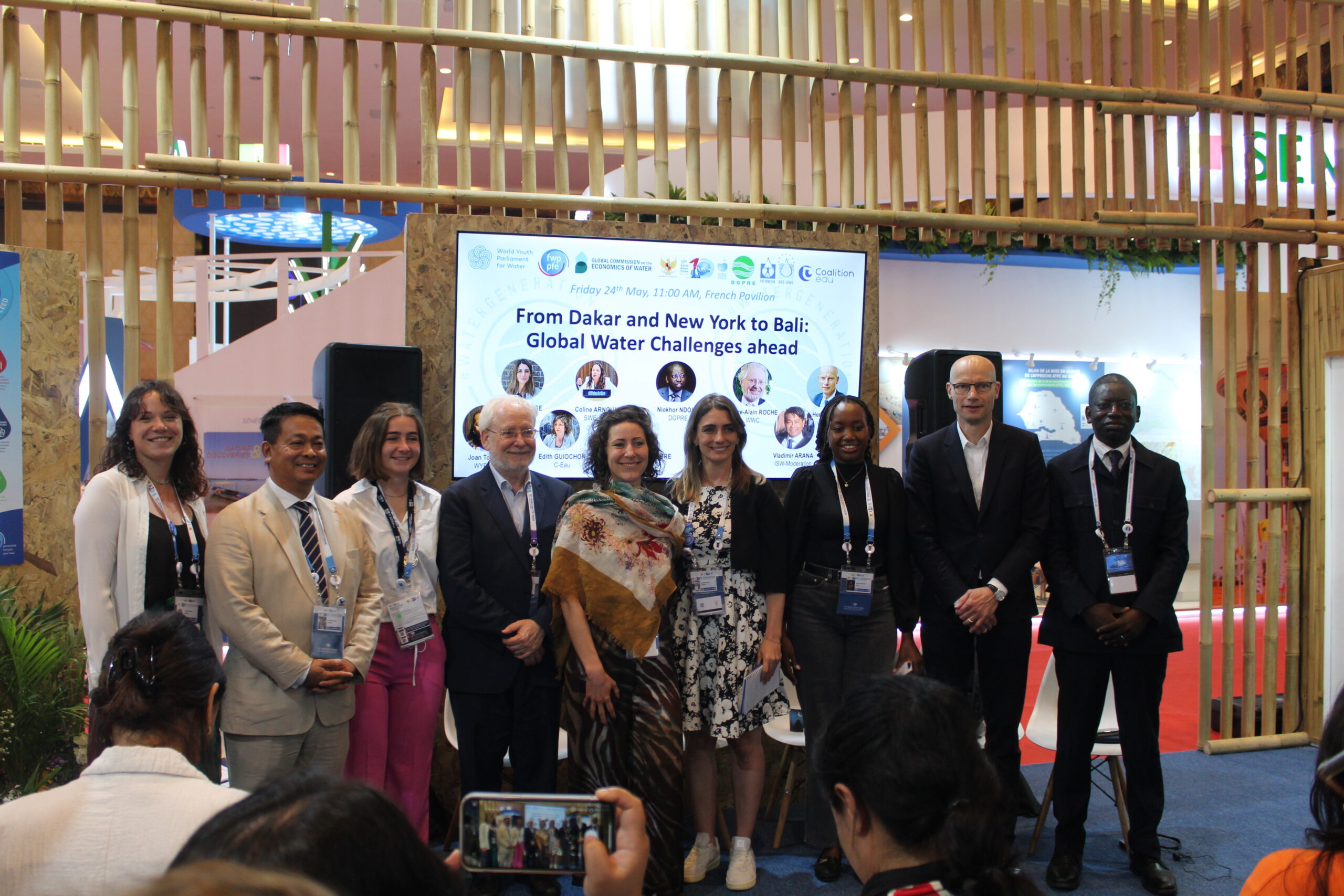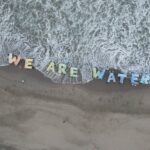Organized under the theme of “Water for Shared Prosperity” in Bali (Indonesia) from May 18 to 25, 2024, the 10th World Water Forum, the 3rd to be held in Asia, has come to a close. A look back at the mobilization of civil society and young people, catalyzed by the International Secretariat for Water.
Impact of the International Secretariat for Water (ISW) at the 10th World Water Forum in Bali
The ISW played a central role at the 10th World Water Forum in Bali. As a catalyst for civil society and youth, it brought together and amplified the voices of those most affected by water issues, notably young people, women and indigenous communities.
Bali WWF in figures
|

The ISW played a key role in the Forum’s debates. In particular, it stressed the crucial importance of including civil society, including young people, in water-related decision-making processes, as well as in discussions on water, peace, sanitation and risk reduction.
ISW contributions in figures
|

Contribution from civil society
ISW, through the NGO coalition Butterfly Effect, strengthened the voice of civil society at the Forum, organizing sessions on the inclusion of marginalized communities and water governance. Despite the challenges associated with civil society participation, their efforts enabled them to present a policy position paper and influence international discussions.

The Butterfly Effect also coordinated two sessions in the Forum’s official program, one on the role of marginalized people in shaping water policies and their concrete proposals, and one on strengthening international water governance, from Dakar to the United Nations in NY and Bali, taking stock of lessons learned from previous Forums and the recent UN Water Conference, and the objectives and expectations for the next UN Water Conferences in 2026 and 2028.
Ensuring inclusive participation, including that of civil society, is essential to achieving the SDGs by 2030 and guaranteeing equitable access to WASH services.
Despite insufficient support for the 10th WWF and the suppression of the Global Alternative Forum, the Butterfly Effect succeeded in financing the participation of 3 members and strengthening partnerships at the event. The global water crisis demands shared action at all levels. The Butterfly Effect will continue its advocacy and mobilization for concrete commitments and better water governance.

The Butterfly Effect at the 10th World Water Forum in brief
|
Youth Mobilization
The ISW organized the 6th General Assembly of the World Youth Parliament for Water (WYPW), bringing together 75 young people from 45 countries. Having received more than 650 applications, the ISW – initiator of the WYPW in 2002 – held this GA on the theme of “Water and Youth: Levers for Cooperation and Peace”, highlighting the urgent need for youth involvement to meet contemporary water-related challenges. The GA’s priorities were to formulate the WYPW’s action plan for the next three years, to amplify the presence and influence of young people at the 10th WFF, and to improve knowledge and skills in advocacy.

A series of events and rich discussions addressed key issues such as water scarcity, pollution and the effects of climate change, peace-building through cooperation, and governance, with contributions from experts such as Dr. Kenzo Hiroki (Professor, Coordinator of the High-Level Panel of Experts and Leaders on Water and Disasters), Danilo Turk (Former President of Slovenia and Senior Policy Advisor to the Geneva Water Hub), Pierre-Alain Roche (Honorary Board Member, World Water Council), Eric Tardieu (INBO Secretary General), Mohammed Diatta (Expert in hydro-diplomacy and Coordinator of the Unit for Monitoring, Promoting and Capitalizing on the Results of the 9th WWF), and Jeevan Thondaman (Sri Lankan Minister of Water). Several workshops also enabled delegates to explore their role within Parliament, share their personal experiences, and refine the youth declaration for the Forum, reinforcing their advocacy techniques.

Youth – through the Global Parliament – made a significant impact at the 10th edition of the Forum. Over four days, youth delegates actively participated in over 50 sessions, including 5 high-level panels, where they advocated for more inclusive water governance. Their participation underlined the importance of youth engagement in water-related decision-making processes.
One of the highlights of the week was the high-level panel on water and peace, where young delegates from Palestine, Syria and Sudan shared their thoughts. Their speeches, delivered to an audience including Michelle Bachelet (former President of Chile), Yves Leterme (former Prime Minister of Belgium) and Janos Ader (former President of Hungary), emphasized the urgent need for water security to foster peace and stability in the world. Delegates’ contributions reinforced the vital importance of water justice, a cause championed by the ISW.
Several sessions were also held on the Youth Space, piloted by the Bali Youth Plan, an important legacy of the work carried out by ISW, SDC and the Senegalese government at the 9th WWF.

Strategic meetings held throughout the Forum with personalities such as UNESCO Deputy Secretary-General Lidia Arthur Brito, the Director of the World Bank Group’s Global Water Practice Saroj Kumar Jha and President Macron’s special envoy Barbara Pompili laid the foundations for future collaboration.
The active participation of young people at the 10th WWF demonstrated the leadership power of the new generation to tackle global water challenges. Their ideas and advocacy efforts enriched discussions and paved the way for more inclusive water governance.
Arts and Awareness raising – WE ARE WATER

Diving into action, delegates from the World Youth Parliament for Water and the Balinese Youth Parliament for Water – under the aegis of the 1MYAC initiative – embarked on a mangrove clean-up mission, collecting an impressive 333 kg of waste, or the equivalent of nearly 8,000 plastic bags.
The trip was not just a litter-picking operation, but also a vibrant celebration of art and advocacy in defense of water quality, sustainable consumption, biodiversity and the climate crisis.

Artist Liina Klauss has teamed up with SIE and Swiss cooperation to create a work of art from plastic bags collected by Balinese environmental heroes in the surrounding rivers and mangroves.
Giant letters on the sands of Bali underlined the slogan: “WE ARE WATER”. The mission? To sound the alarm about the threat of plastic pollution to us humans and our precious Mother Nature.
“WE ARE WATER” reminds us that we are all linked by the water cycle, urging us to protect this essential resource.

Results and Prospects
The main outcome of the Forum was a ministerial declaration. While not bringing any spectacular progress, it does offer a few new elements, such as a compendium of concrete results and actions, covering 112 projects involving some 30 countries and 50 international organizations, donors and beneficiaries. The Forum also led to initiatives such as the Bali Basin Champions Agenda, which includes various collaboration and capacity-building measures.
However, questions remain about the long-term impact of these commitments. The ISW will continue to bring the voices of youth and civil society to future international discussions, notably at the United Nations Water Conferences in 2026 and 2028.
Conclusion
Although the Forum led to strong mobilization and several initiatives in the sector, the absence of mechanisms for monitoring and evaluating the commitments made, as well as the lack of linkage with UN processes, raise questions.
However, the ISW reaffirmed its role as a leader in advocating more inclusive water governance, mobilizing youth and civil society at the 10th World Water Forum. Thanks to its many partnerships and interventions, the ISW continues to develop its advocacy in view of upcoming international deadlines, such as the One Water Summit, the 2024 Future Summit, and the 2026 and 2028 United Nations Water Conferences.
It is essential to ensure that the role of young people and civil society in achieving Sustainable Development Goal 6 is properly recognized and supported.















